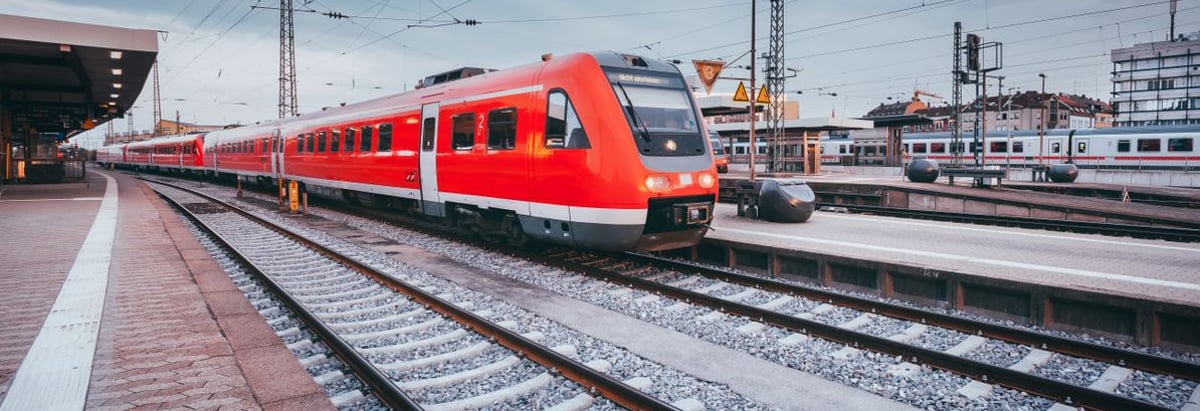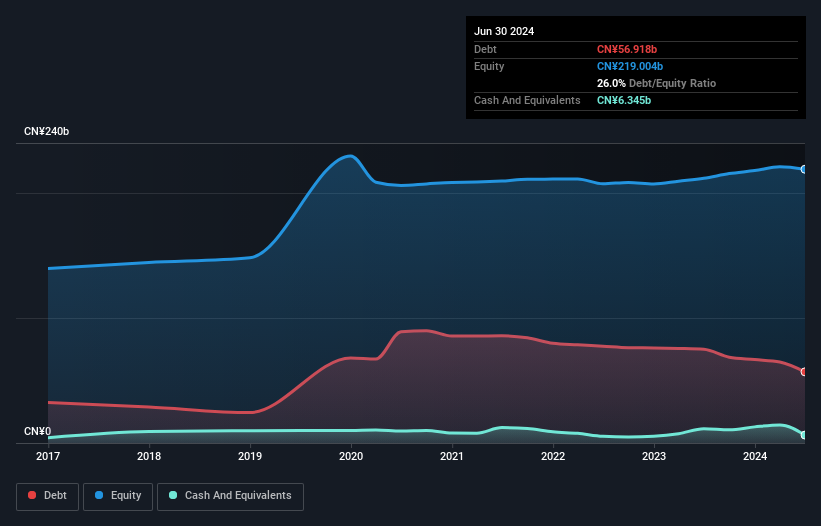- China
- /
- Transportation
- /
- SHSE:601816
We Think Beijing-Shanghai High-Speed Railway (SHSE:601816) Can Manage Its Debt With Ease

David Iben put it well when he said, 'Volatility is not a risk we care about. What we care about is avoiding the permanent loss of capital.' When we think about how risky a company is, we always like to look at its use of debt, since debt overload can lead to ruin. As with many other companies Beijing-Shanghai High-Speed Railway Co., Ltd. (SHSE:601816) makes use of debt. But the real question is whether this debt is making the company risky.
Why Does Debt Bring Risk?
Generally speaking, debt only becomes a real problem when a company can't easily pay it off, either by raising capital or with its own cash flow. Ultimately, if the company can't fulfill its legal obligations to repay debt, shareholders could walk away with nothing. However, a more usual (but still expensive) situation is where a company must dilute shareholders at a cheap share price simply to get debt under control. Having said that, the most common situation is where a company manages its debt reasonably well - and to its own advantage. When we examine debt levels, we first consider both cash and debt levels, together.
See our latest analysis for Beijing-Shanghai High-Speed Railway
What Is Beijing-Shanghai High-Speed Railway's Debt?
As you can see below, Beijing-Shanghai High-Speed Railway had CN¥56.9b of debt at June 2024, down from CN¥75.0b a year prior. However, because it has a cash reserve of CN¥6.35b, its net debt is less, at about CN¥50.6b.

How Healthy Is Beijing-Shanghai High-Speed Railway's Balance Sheet?
According to the last reported balance sheet, Beijing-Shanghai High-Speed Railway had liabilities of CN¥14.3b due within 12 months, and liabilities of CN¥50.6b due beyond 12 months. On the other hand, it had cash of CN¥6.35b and CN¥2.43b worth of receivables due within a year. So it has liabilities totalling CN¥56.1b more than its cash and near-term receivables, combined.
Given Beijing-Shanghai High-Speed Railway has a humongous market capitalization of CN¥296.6b, it's hard to believe these liabilities pose much threat. Having said that, it's clear that we should continue to monitor its balance sheet, lest it change for the worse.
We use two main ratios to inform us about debt levels relative to earnings. The first is net debt divided by earnings before interest, tax, depreciation, and amortization (EBITDA), while the second is how many times its earnings before interest and tax (EBIT) covers its interest expense (or its interest cover, for short). This way, we consider both the absolute quantum of the debt, as well as the interest rates paid on it.
With a debt to EBITDA ratio of 2.0, Beijing-Shanghai High-Speed Railway uses debt artfully but responsibly. And the alluring interest cover (EBIT of 9.5 times interest expense) certainly does not do anything to dispel this impression. Importantly, Beijing-Shanghai High-Speed Railway grew its EBIT by 90% over the last twelve months, and that growth will make it easier to handle its debt. When analysing debt levels, the balance sheet is the obvious place to start. But it is future earnings, more than anything, that will determine Beijing-Shanghai High-Speed Railway's ability to maintain a healthy balance sheet going forward. So if you're focused on the future you can check out this free report showing analyst profit forecasts.
Finally, a company can only pay off debt with cold hard cash, not accounting profits. So it's worth checking how much of that EBIT is backed by free cash flow. Happily for any shareholders, Beijing-Shanghai High-Speed Railway actually produced more free cash flow than EBIT over the last three years. That sort of strong cash conversion gets us as excited as the crowd when the beat drops at a Daft Punk concert.
Our View
The good news is that Beijing-Shanghai High-Speed Railway's demonstrated ability to convert EBIT to free cash flow delights us like a fluffy puppy does a toddler. And the good news does not stop there, as its EBIT growth rate also supports that impression! Looking at the bigger picture, we think Beijing-Shanghai High-Speed Railway's use of debt seems quite reasonable and we're not concerned about it. After all, sensible leverage can boost returns on equity. The balance sheet is clearly the area to focus on when you are analysing debt. But ultimately, every company can contain risks that exist outside of the balance sheet. For instance, we've identified 1 warning sign for Beijing-Shanghai High-Speed Railway that you should be aware of.
If you're interested in investing in businesses that can grow profits without the burden of debt, then check out this free list of growing businesses that have net cash on the balance sheet.
Valuation is complex, but we're here to simplify it.
Discover if Beijing-Shanghai High-Speed Railway might be undervalued or overvalued with our detailed analysis, featuring fair value estimates, potential risks, dividends, insider trades, and its financial condition.
Access Free AnalysisHave feedback on this article? Concerned about the content? Get in touch with us directly. Alternatively, email editorial-team (at) simplywallst.com.
This article by Simply Wall St is general in nature. We provide commentary based on historical data and analyst forecasts only using an unbiased methodology and our articles are not intended to be financial advice. It does not constitute a recommendation to buy or sell any stock, and does not take account of your objectives, or your financial situation. We aim to bring you long-term focused analysis driven by fundamental data. Note that our analysis may not factor in the latest price-sensitive company announcements or qualitative material. Simply Wall St has no position in any stocks mentioned.
About SHSE:601816
Beijing-Shanghai High-Speed Railway
Beijing-Shanghai High-Speed Railway Co., Ltd.
Excellent balance sheet with proven track record.
Market Insights
Community Narratives



